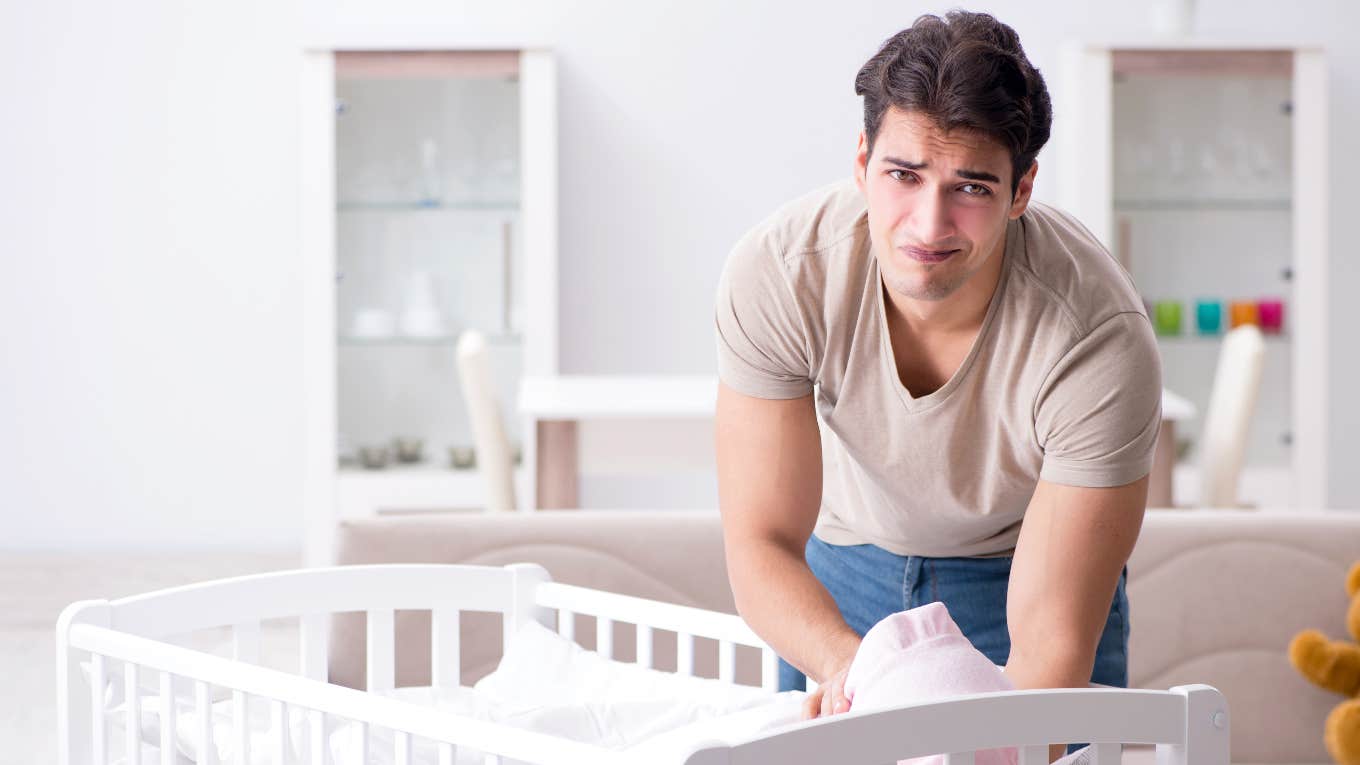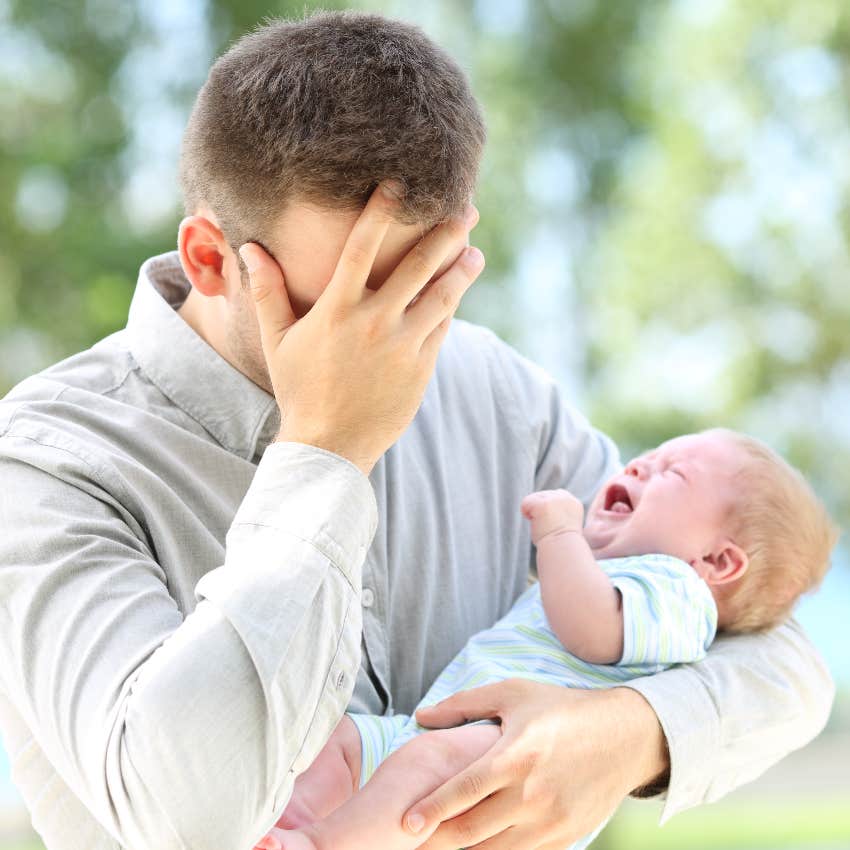New Dad Asks If He's A Bad Parent Because He 'Hates' His Newborn Baby — 'Why Do I Feel So Bad?'
New dads, just like many new moms, often experience depression.
 Elnur | Shutterstock
Elnur | Shutterstock The early stages of parenthood are difficult for many, and while we often hear about postpartum mothers struggling, fathers are not immune.
One new dad is not enjoying fatherhood and is concerned that something is wrong with him because of the negative feelings he harbors towards his baby boy.
A father asked if he was a bad parent because he 'hates' his newborn baby.
The 21-year-old new dad named Jacob called into “The Dr. John Delony Show,” a caller-driven show where host and mental and emotional health expert John Delony helps callers navigate through relationship and mental health challenges.
He shared an astounding confession regarding his nearly 8-week-old son, Charlie.
While expectant parents are told that they will feel a surge of never-before-felt love when they meet their babies, Jacob has not had that experience.
“I’m not sure if there’s maybe a right or wrong way to ask this…but why do I hate my newborn so much?” he asked.
John admitted that it was the first time that he had shared his feelings toward the baby out loud.
“Why do I feel so bad?” he asked, his voice breaking.
The new dad explained that he and his wife welcomed baby Charlie nearly eight weeks ago, shortly after getting married. The two had been dating for about a year and a half.
While there is nothing particularly wrong with the baby himself, Jacob’s entire world has understandably shifted. He has found it difficult to take care of himself while also looking after a newborn.
“I feel like I’m trying to force it,” he said of his feelings of love for his baby that don’t seem to be there.
The new dad was assured that he was not a bad person or parent and that his feelings were completely normal.
“Your world just exploded," Delony empathized. "Your girlfriend overnight became your wife. The limited money you had is completely gone. Your body feels terrible and you haven’t slept."
He explained that this is a standard experience for new parents.
“One of the most common conversations I have with brand-new dads behind closed doors," Delony said, "is, ‘I’ve never poured into something, I’ve never given every thought, every ounce of everything I’ve got … [like I have] into this little being [who] won’t even acknowledge me.'”
The beginning stages of parenthood are undeniably overwhelming. Anyone would feel slightly resentful of someone who completely took over their usual routine and demonstrated little to no appreciation — even if that someone is a baby who can't help it. Yet somehow, we expect new parents to love every second of their new normal.
Commenters further assured Jacob that he was not alone in his experience.
“It’s tough the first few months. I don’t hate my son at all but when he wakes me up two or three times in the middle of the night I side-eye the heck out of him,” one TikTok user commented.
“This is not abnormal. Glad he talked about it. I literally talked a male coworker through the same thing. It gets better. I promise,” another user shared.
Around 10% of new fathers suffer from depression after having a baby.
Postpartum depression in new moms is widely discussed, and there are numerous resources they can turn to when they are struggling. However, new dads do not receive nearly the same amount of attention and little light is shed on their feelings postpartum.
While they certainly do not experience the same hormonal shifts that women do after giving birth, many new dads still grapple with feelings of sadness and despair. In fact, research published by the Journal of the American Medical Association found that around 1 in 10 new fathers suffer from depression after having a baby.
“Everyone knows that mothers’ hormones change a lot during and after pregnancy. But there’s evidence that fathers also experience real changes in their hormone levels after a baby is born,” Psychologist Scott Bea told The Cleveland Clinic. Changes in a man’s testosterone, cortisol, and oxytocin levels when they become dads can greatly impact their emotional states.
There are, of course, several other reasons new dads may experience depression and anxiety in the beginning stages of parenthood that are unrelated to hormonal reasons.
 Antonio Guillem | Shutterstock
Antonio Guillem | Shutterstock
For one, there is the societal expectation that dads must work to financially provide for their families. This often puts an exceptional amount of pressure and stress on them to do well at work while also balancing life with a newborn.
The lack of paternity leave in most American companies only compounds this. New dads are expected to jump right back into work, business as usual, immediately after welcoming their babies, allowing them little time to adjust to fatherhood and bond with their kids.
New dads may also find that their relationship dynamic with their partners changed after the arrival of their baby. All of the focus they used to put on each other now shifts to their child, and there is little time for connection, communication, and intimacy, causing a strain and emotional distance.
If you happen to know a new dad who is struggling and appears to dislike or even hate his new baby, we promise that he likely is not a monster.
Feelings of hatred are often blurred with feelings of stress and exhaustion. New parents more than likely do not hate their children. They are simply overwhelmed with the path of parenthood they must embark on.
Megan Quinn is a writer at YourTango who covers entertainment and news, self, love, and relationships.

